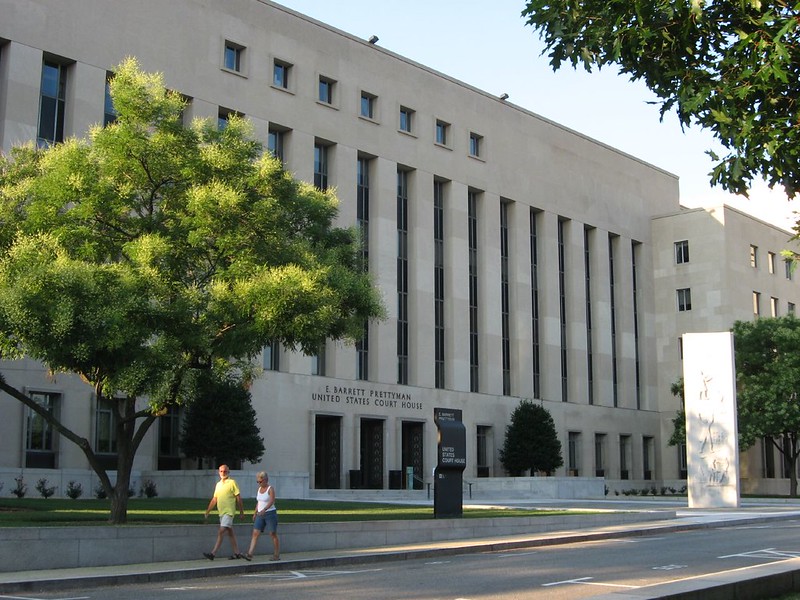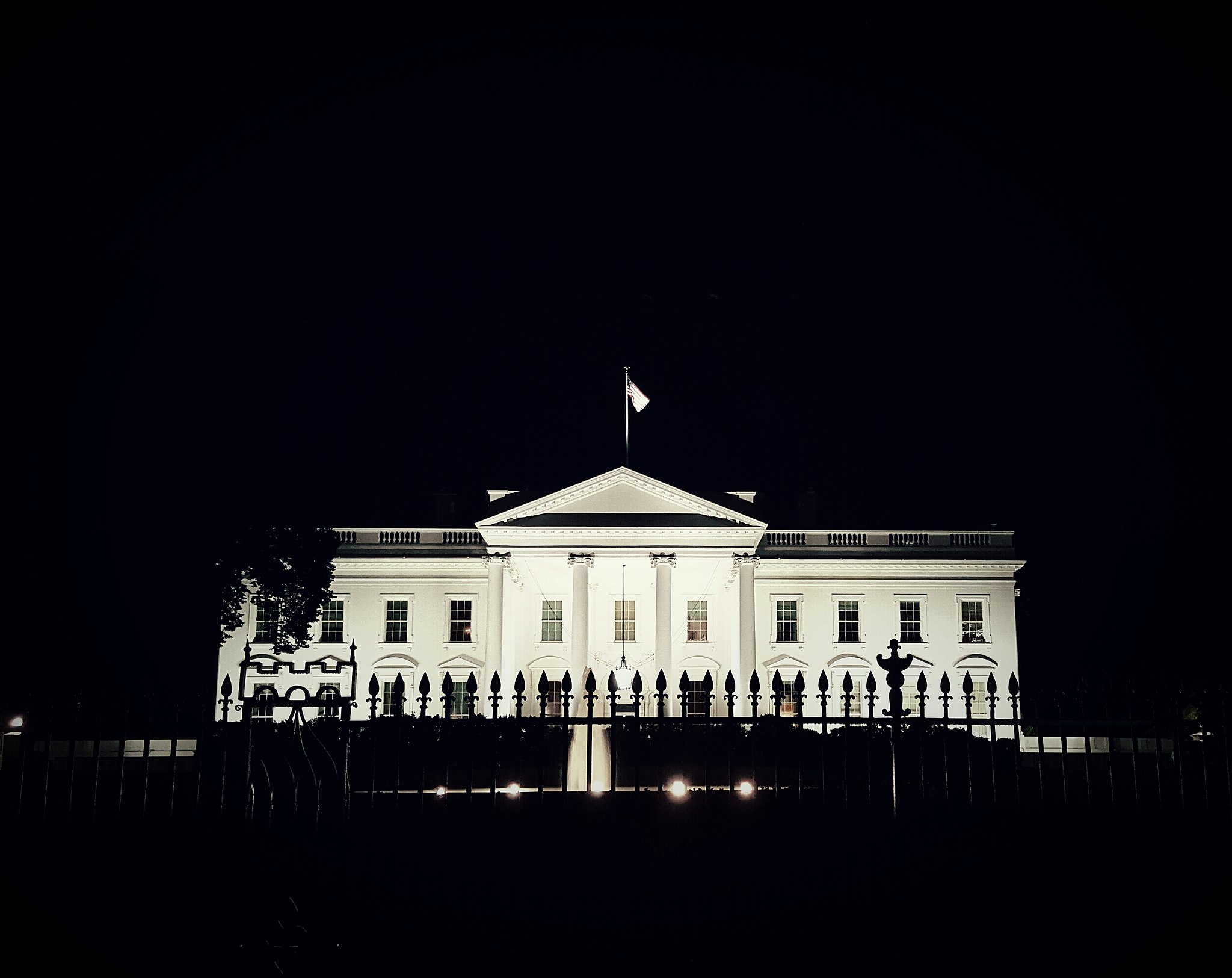In the Jan. 6 Lawsuits, the Justice Department Cuts Trump Loose
The department argues that presidential immunity does not protect Donald Trump from civil suit over his actions on Jan. 6.

Published by The Lawfare Institute
in Cooperation With

Relatively few amicus briefs rise to the level of meriting a response from Donald Trump. But last week, with a brief filed in a case concerning Trump’s civil liability for his role in the Jan. 6 insurrection, the Justice Department drew the former president’s attention on Truth Social: “The Department of Justice has rightfully agreed that presidential immunity is broad and absolute,” read a statement posted by Trump on his bespoke social media platform and attributed to a “Trump Spokesperson.” The statement closed, “All witch hunts and hoaxes have to end!”
If you’d read only Trump’s Truth Social post, you could be forgiven for thinking that the Justice Department had sided with Trump in his argument that absolute presidential immunity shields him from civil suit over his actions on Jan. 6. In fact, the department took the opposite view. The filing that attracted Trump’s attention argued instead that presidential immunity does not protect him from these lawsuits.
That’s a striking position for the government to take—and it’s worth a close look. Throughout Trump’s presidency and its aftermath, the Justice Department has struggled to navigate the difficult dynamics of defending the office of the presidency without excusing Trump’s abuses of power. In this brief, the department threads the needle of protecting its traditional interest in defending robust executive power while refusing to shield Trump from all accountability.
The brief was filed at the request of the U.S. Court of Appeals for the District of Columbia Circuit, which asked the Justice Department to weigh in as it considers three consolidated cases: Blassingame v. Trump, Thompson v. Trump, and Swalwell v. Trump. In each, the plaintiffs—Capitol Police officers in Blassingame, along with a collection of members of Congress including Reps. Bennie Thompson (D-Miss.) and Eric Swalwell (D-Calif.)—seek to hold Trump liable, arguing that he instigated the violent attack on the Capitol, largely through his inflammatory “Stop the Steal” speech on Jan. 6. The district court held that Trump’s speech was protected neither by the First Amendment under Brandenburg v. Ohio nor by the doctrine of presidential immunity as established by the Supreme Court in Nixon v. Fitzgerald, which held that presidents are absolutely immune from civil suits for actions taken within the “outer perimeter” of their “official responsibilities.”
Trump appealed the court’s denial of absolute immunity—though oddly not the legally shaky First Amendment holding. The D.C. Circuit heard oral argument late last year. Though the panel expressed skepticism at Trump’s expansive view of immunity, the appeals court nevertheless requested the government’s input before ruling on the issue.
Speaking in January 2022 on the first anniversary of the insurrection, Attorney General Merrick Garland insisted that the Justice Department would “do everything in our power to defend the American people and American democracy.” That language might have suggested that the department would come out swinging against Trump in Blassingame—but despite Garland’s rhetoric, it wasn’t initially obvious what position the Justice Department would take. The department has typically taken a broad view of presidential immunity. And its understanding of its institutional responsibilities toward the office of the presidency has already led it to defend Trump in another high-profile case—a defamation lawsuit by the writer E. Jean Carroll, who has accused Trump of raping her. So it was entirely possible that, despite its aggressive prosecution of Jan. 6 rioters in criminal court and the ongoing special counsel investigation of Trump himself, the Justice Department’s Blassingame brief might have argued for Trump’s immunity in civil court.
In the end, Trump’s Truth Social post was half right: The Justice Department’s brief does argue that “presidential immunity is broad and absolute.” But the Justice Department also argues that this immunity has its limits. “Nixon v. Fitzgerald establishes a rule of absolute immunity for the President’s official acts,” the brief states. “It is not a rule of absolute immunity for the President regardless of the nature of his acts.”
The government makes clear that it “expresses no view on the district court’s conclusion that plaintiffs have plausibly alleged that President Trump’s January 6 speech incited the subsequent attack on the Capitol.” But the department argues that if Trump is found to have engaged in incitement, such that his speech would not receive First Amendment protection, the speech would likewise fall outside the “outer perimeter” of presidential duties and would not be shielded under Fitzgerald, either. As the brief puts it, the “President’s speech on a matter of public concern is not protected by absolute immunity if it constitutes incitement to imminent private violence.” This analysis knits together two separate questions considered by the district court: whether Trump’s speech should receive First Amendment protection and whether he is immune from suit under Fitzgerald.
This doesn’t mean that the department has flung caution to the wind. As if to calm the itchy fingers of a million Twitter pundits, the brief emphasizes that “[t]he United States does not express any view regarding the potential criminal liability of any person for the events of January 6, 2021, or acts connected with those events.” And again and again, the government underlines the importance of maintaining presidential immunity within Fitzgerald’s “outer perimeter,” which includes a “vast realm” of public speech. Courts, the department writes, “must take care not to adopt rules that would unduly chill legitimate presidential communication or threaten to saddle the President with suits that would be burdensome and intrusive.” It’s just that inciting violence—if that’s indeed what Trump did on Jan. 6—is so far outside the scope of “legitimate presidential communication” that the Justice Department isn’t too worried about chilling it.
This intellectual move speaks to a broader tension that both the Justice Department and the courts have grappled with since Trump first came into office. Trump’s actions as president often stretched the limits of the role, raising the question of to what extent the legal system could distinguish between the august institution of the presidency and the foibles of the person who held it. In Carroll’s defamation case, for example, the first filing made by the Justice Department under the Biden administration decried Trump’s comments about Carroll—the president had told reporters, “She’s not my type”—as “crude and disrespectful.” But the department emphasized that the suit involved “questions that implicate the institutional interests of the federal government.” Again and again, both courts and Justice Department lawyers have found themselves issuing rulings and making arguments that can seem on the surface to give a pass to Trump’s appalling behavior, in service of focusing on the authorities of an abstracted chief executive distinct from Trump.
The Justice Department’s Blassingame filing, in contrast, identifies a means of potentially cleaving Trump from the power and protections of the presidency—on the grounds that the disjuncture between Trump’s office and his actions on Jan. 6. is just so vast that it’s not actually a hard decision. Even the most expansive interpretation of Article II cannot encompass inciting a violent mob to attack Congress and overturn a presidential election.
As if to emphasize the gulf between Trump the man and the office of the presidency, the brief adds a crucial word to the usual Brandenburg test for incitement, asking not whether Trump was inciting “imminent lawless action” or imminent violence, but whether he was inciting “imminent private violence” (emphasis added). The implication is that Trump was acting not as a public official but as the summoner of a personal militia.
There’s an echo here of Special Counsel Robert Mueller’s constitutional analysis as to whether the obstruction of justice statutes could apply to presidential conduct. Mueller, too, was faced with the question of whether the normal trappings of the presidency would shield even aberrant actions by Trump. The special counsel took the view that applying obstruction statutes to conduct within the president’s authority under Article II wouldn’t risk chilling future presidents—because “in virtually all instances, there will be no credible basis for suspecting a corrupt personal motive.” Essentially, the argument is that Trump’s potential obstruction of justice as described in the Mueller Report was simply so outside the norm of presidential behavior, so appalling, that it could be easily distinguished from the normal conduct of the presidency.
Mueller’s reasoning has received a great deal of criticism, and the legal questions he faced were different from the issues the Justice Department addresses in Blassingame. Among other things, he was addressing potential criminal, not civil, liability. But both the Mueller Report and the Blassingame brief seek to draw a similar line between Trump’s abuses and the institution he occupied—and cast Trump as an aberration. Perhaps some actions are so egregious—and some motives so incompatible with the character traits that presidents must have to discharge their constitutional obligations—that Article II simply can’t extend to those actions.
In Blassingame, the Justice Department’s brief prudently hews closely to what seemed like the consensus among the D.C. Circuit panel at oral argument: that, whatever legal complexities presidential immunity raises as a general matter, the facts in this case are so egregious as to justify a narrow, fact-bound denial of presidential immunity. As one of us has noted previously, extreme facts can make easy law. (Indeed, the Justice Department goes out of its way to urge the court not to address broader and more complex issues, like whether a president should ever get immunity for electoral activities.) This narrow approach makes sense, both as a matter of the department’s natural caution but also as responsive to the D.C. Circuit’s clear invitation for institutional cover to deny Trump immunity in this case. The D.C. Circuit doesn’t need the Justice Department’s permission, but it surely wouldn’t mind some reassurance that the executive branch is on board.
Beyond shedding light on the Justice Department’s evolving understanding of presidential immunity, the brief has several potential downstream consequences for Trump’s legal liability. Most immediately, it makes it more probable—we’d hazard to guess even highly likely—that the D.C. Circuit will deny Trump immunity in this case, albeit on the narrow grounds that the government has suggested. Trump will undoubtedly appeal to the Supreme Court, which in turn is quite likely to hear the case, raising as it does core issues of executive power and offering an opportunity for the Court to clarify its aging, four-decades-old Nixon v. Fitzgerald precedent. How the Supreme Court would rule is anybody’s guess, but given the 6–3 conservative supermajority, Trump would certainly have a fighting chance.
The Justice Department’s brief also gives clues to how, if it chooses to indict Trump for his campaign to overthrow the 2020 election, the department would prosecute the case. Although presidents are not categorically immune from criminal liability for official actions, any substantive defense to such an indictment would undoubtedly include a claim that the action was not illegal because it was within the president’s official duties. (Trump’s lawyers made similar arguments in relation to the Mueller probe, though no criminal charges resulted.) Here, the Justice Department has already made the case for why Trump’s Jan. 6 speech doesn’t fall within that scope.
We wouldn’t go so far as Laurence Tribe, who argues that the Justice Department’s brief is a “signal” that a Trump indictment is “more likely than not.” A criminal trial brought by the federal government would have much higher legal and political stakes, not to mention burdens of proof, than does a civil suit brought by a collection of individuals. But if the Justice Department does indict Trump, it will have a ready answer when he claims that his conduct on and around Jan. 6 was—as he likes to insist about his other abuses of power—“perfect.”






